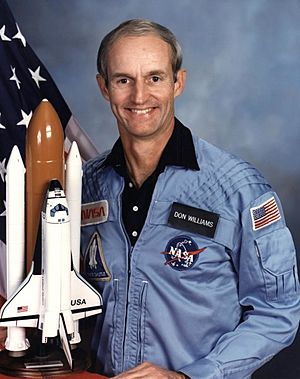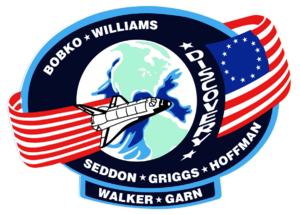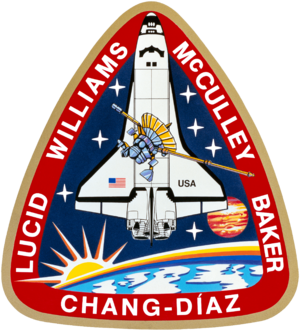Donald E. Williams facts for kids
Quick facts for kids
Donald E. Williams
|
|
|---|---|
 |
|
| Born | February 13, 1942 Otterbein, Indiana, U.S.
|
| Died | February 23, 2016 (aged 74) |
| Nationality | American |
| Other names | Donald Edward Williams |
| Alma mater | Purdue University, B.S. 1964 |
| Occupation | Naval aviator, test pilot |
| Awards | |
| Space career | |
| NASA astronaut | |
| Rank | |
|
Time in space
|
11d 23h 34m |
| Selection | 1978 NASA Group 8 |
| Missions | STS-51-D, STS-34 |
|
Mission insignia
|
|
| Retirement | March 1, 1990 |
Donald Edward Williams (born February 13, 1942, died February 23, 2016) was an amazing American NASA astronaut. He was also a brave Navy pilot, a test pilot, and an engineer. He spent over 287 hours in space!
Contents
Early Life and School
Donald Williams was born on February 13, 1942, in Lafayette, Indiana. He grew up in a town nearby called Green Hill. He finished high school in Otterbein in 1960. Later, he went to Purdue University. In 1964, he earned a degree in mechanical engineering.
Williams joined the Navy through a special program at Purdue. He learned to fly planes in Florida, Mississippi, and Texas. In May 1966, he officially became a Navy pilot.
After training, he flew A-4 Skyhawk jets. He went on two missions during the Vietnam War aboard the huge aircraft carrier USS Enterprise. He also taught other pilots how to fly. Later, he flew the A-7 Corsair II jet. He went on two more missions in Vietnam, again on the USS Enterprise. In total, he flew 330 combat missions.
In 1974, Williams went to the United States Naval Test Pilot School. This is where pilots learn to test new aircraft. He worked in different roles, testing planes for the Navy. He flew for over 6,000 hours, mostly in jet planes. He also landed on aircraft carriers 745 times!
Becoming a NASA Astronaut
In January 1978, NASA chose Donald Williams to be an astronaut. By August 1979, he was ready to fly the Space Shuttle. He helped test the Shuttle's systems and worked at the Kennedy Space Center. There, he helped prepare the Space Shuttle for launch and landing.
From 1982 to 1983, he helped manage the Space Shuttle program. He also worked as a leader in the Astronaut Office.
Williams flew two space missions:
Space Missions
STS-51-D: First Flight
His first mission, STS-51-D, was from April 12 to 19, 1985. The Space Shuttle launched and landed at the Kennedy Space Center in Florida. During this flight, the crew put two satellites into space. One of the satellites had a problem. This led to the first unplanned spacewalk from the Space Shuttle to try and fix it.
The crew also did many science experiments. They even filmed themselves playing with toys in space! Donald Williams was the first person to juggle in space during this mission. The mission lasted about 7 days, orbiting Earth 109 times.
STS-34: Journey to Jupiter
His second mission, STS-34, was from October 18 to 23, 1989. It launched from Kennedy Space Center and landed in California. On this mission, the crew launched the Galileo spacecraft. This spacecraft began its long journey to explore the planet Jupiter.
The astronauts also used a special tool to map the ozone layer in Earth's atmosphere. They did many other experiments too. These included studying radiation, how materials change in space, lightning, how plants grow in microgravity, and how ice crystals form in space. This mission lasted about 5 days, orbiting Earth 79 times.
After NASA
In March 1990, Donald Williams retired from the U.S. Navy as a Captain. He also left NASA. He then worked for a company called Science Applications International Corporation (SAIC). He worked on many projects in Houston and around the world. In April 2006, Williams retired from SAIC.
Donald Williams passed away on February 23, 2016, at the age of 74.
Achievements and Awards
Donald Williams was a member of important groups like the Society of Experimental Test Pilots. He received many awards for his service and bravery, including:
- Legion of Merit
- Distinguished Flying Cross
- Defense Superior Service Medal
- NASA Outstanding Leadership Medal
- NASA Space Flight Medal
- NASA Exceptional Service Medal
 | Anna J. Cooper |
 | Mary McLeod Bethune |
 | Lillie Mae Bradford |



